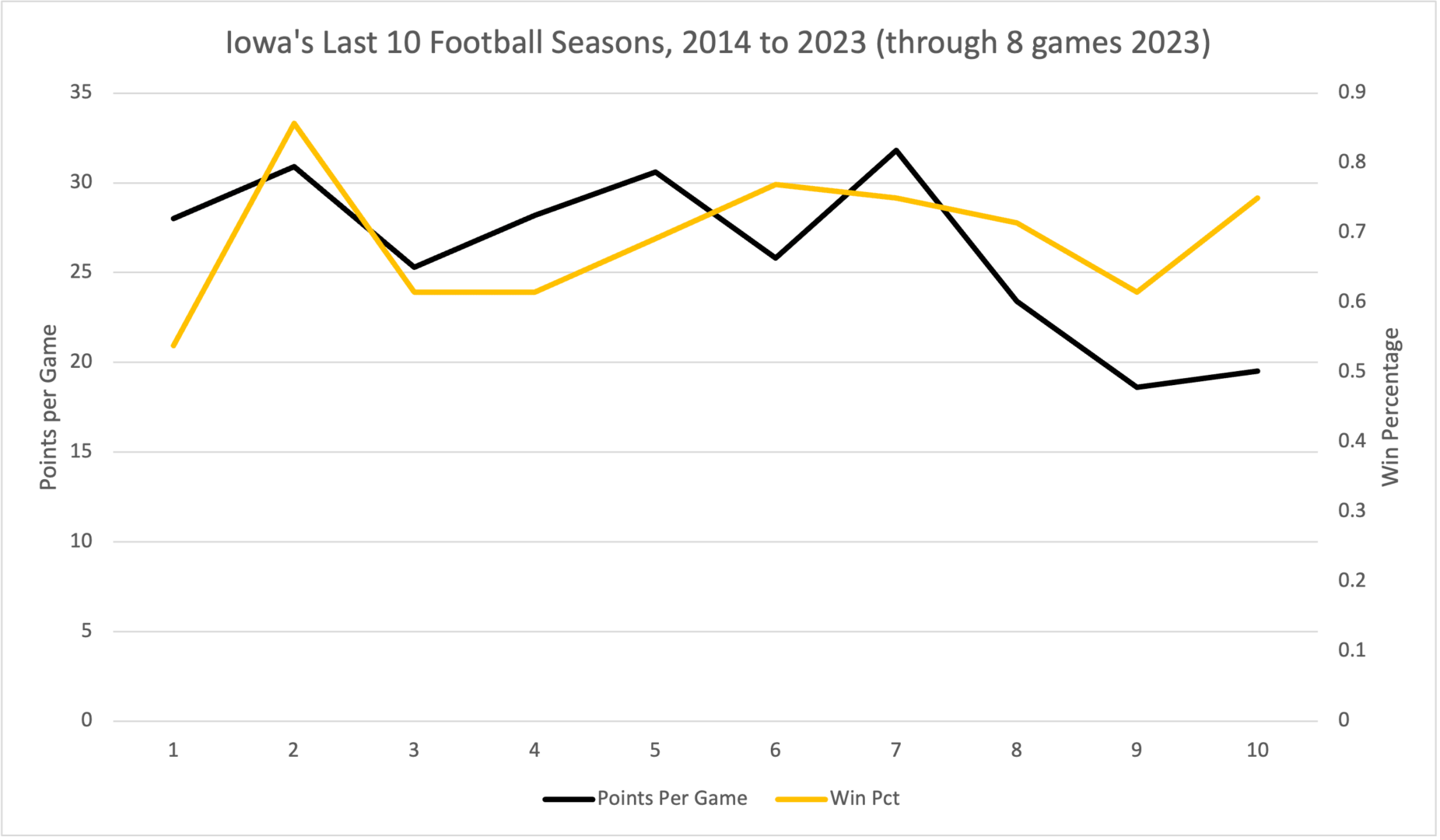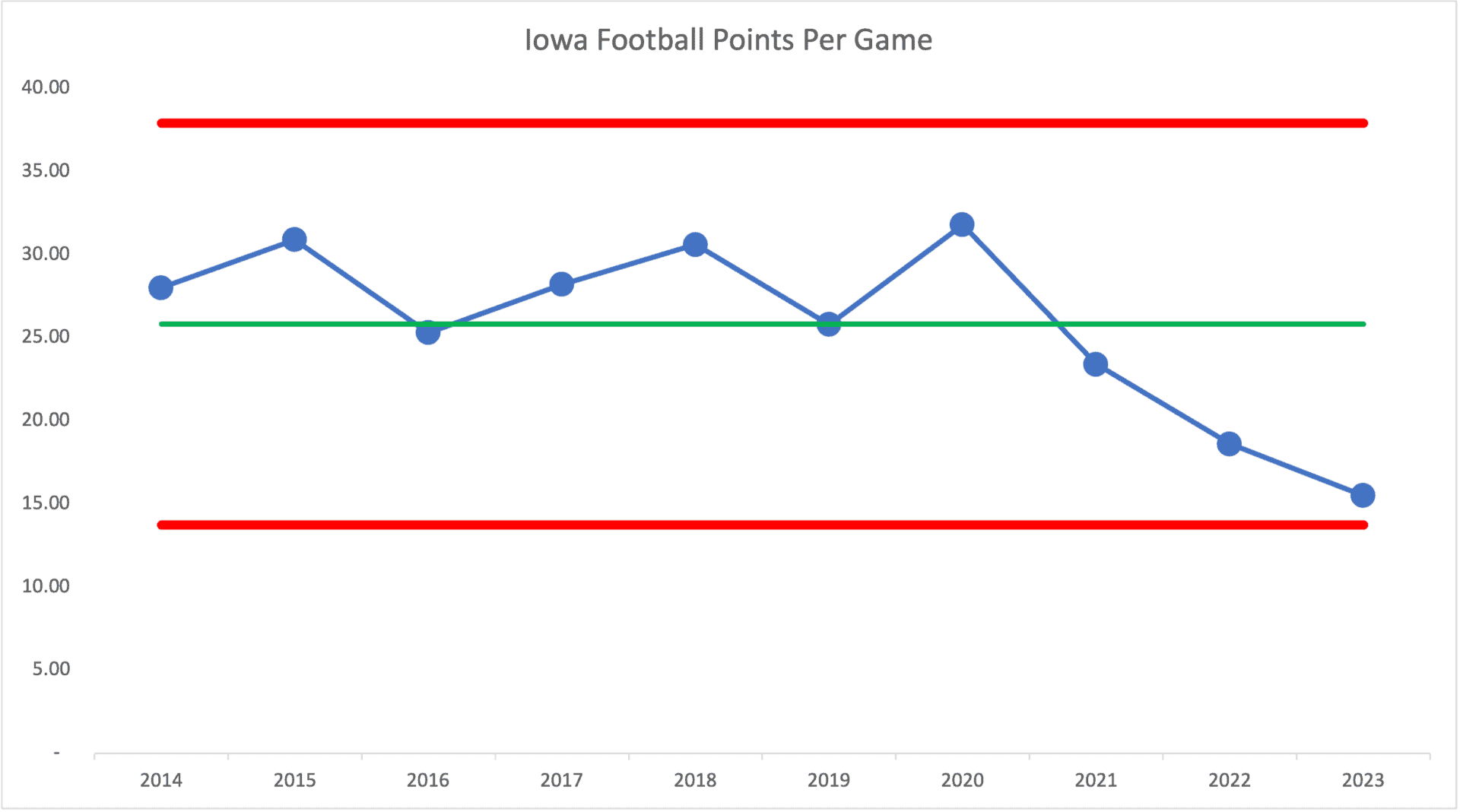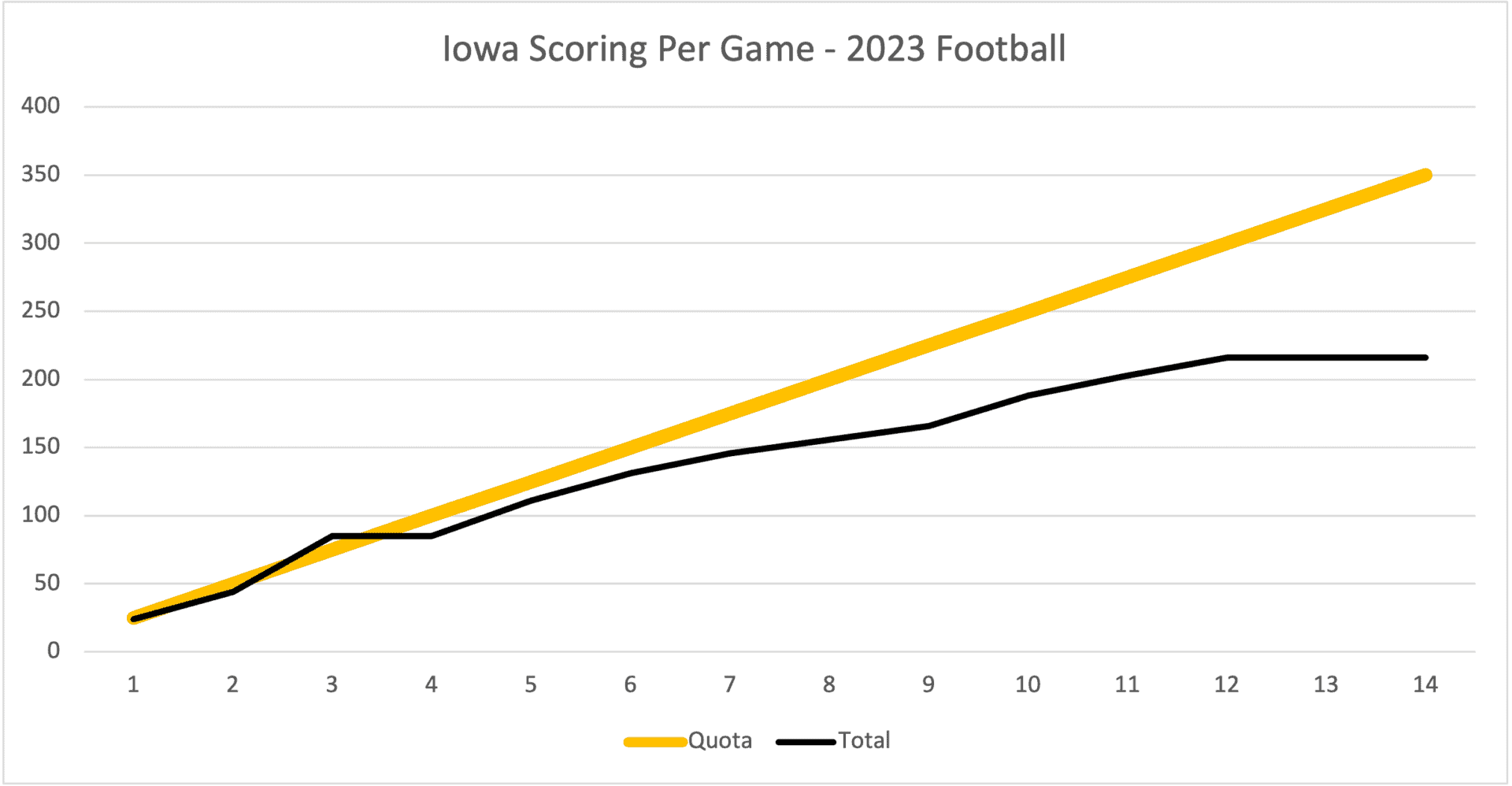tl;dr: This blog post analyzes the unusual incentive clause in the contract of Iowa football's offensive coordinator, Brian Ferentz, which mandates a minimum average of 25 points per game for his contract to be extended. It questions the efficacy and ethical implications of such extrinsic motivations in sports, especially in collegiate football.
The point of American football, including college football at the NCAA level, is to score more points than your opponent. And the University of Iowa Hawkeyes have had trouble doing that in recent years.
They play in the low-scoring, punt-loving West Division of the Big Ten Conference (as a division rival of my alma mater, the Northwestern Wildcats).
If you Google “how bad is Iowa football offense?” you get a lot of statistics and opinions.
As of last week, before they beat Michigan State last Saturday, Iowa ranked 129th out of 133 “FBS” level teams in “total offense.” But that's a measure of yards per game. You don't get points for yards. You don't win games for having more yards. You get points for touchdowns, field goals, and (on defense) safeties.
Iowa has been on a downhill trajectory in terms of points scored and their ranking:
| Year | Points Per Game | FBS Ranking | Win Pct | |
| 2014 | 28.0 | 65 | .538 | |
| 2015 | 30.9 | 48 | .857 | |
| 2016 | 25.3 | 81 | .615 | |
| 2017 | 28.2 | 59 | .615 | |
| 2018 | 30.6 | 39 | .692 | |
| 2019 | 25.8 | 74 | .769 | |
| 2020 | 31.8 | 39 | .750 | |
| 2021 | 23.4 | 94 | .714 | |
| 2022 | 18.6 | 117 | .615 | |
| 2023 | 22.2 | 87 | .800 |

And here is a “process behavior chart” for the points per game number. There's no evidence of a “statistical signal” over the last three seasons using these years for the chart. Forgive me for not going back and getting more data points.
Updated to include the final 2023 number (15.5 pts per game):

Even with lower scoring, the team still won eight games last year, despite ranking last in the nation in total offense (by yards) per this article. For context, their last losing season was 2012. But I think their fan base expects more seasons like 2015 (when they went 12-2) every year, so they've focused their blame and ire on the offensive coordinator. See their year-by-year records.
What's the Problem?
So what's wrong with the offense? Why haven't they averaged 25 points per game since 2019?
Google A.I. search results say… “Some reasons for Iowa's poor offense include:
- An injury-riddled unit
- An underperforming offensive line
- A struggling quarterback
- A ridiculed offensive coordinator
- A run game that is well below average
- A passing attack that may be improving but remains anemic
- More turnovers”
That “ridiculed offensive coordinator” is Brian Ferentz. He also happens to be the son of long-term head coach Kirk Ferentz.
So, you have a poorly performing unit… and what seems like a nepotism issue you might see in a family-owned manufacturing business where the founder is unlikely to fire a child from a leadership role.
A Surprising Incentive Clause
Many schools would have fired their offensive coordinator already. What did Iowa do, and why do I think this whole topic is fascinating?
They put an incentive clause into his contract — a quota for scoring points. He's not fired if they don't score 25 points per game, but his “contract will expire” if he doesn't reach that mark. They might offer him a new contract, but possibly at a lower salary.
As this article says:
Brian Ferentz's contract will expire if Hawkeyes don't average 25 PPG
Update (Oct 30): Iowa offensive coordinator Brian Ferentz won't return in 2024
“The Hawkeyes must score at least 25 points per game in the 2023 season or his contract will terminate on June 30, 2024, per multiple reports. Iowa must also win at least seven games, which can include a bowl game, as part of the clause. If the Hawkeyes hit those marks, Ferentz's contract will auto-extend through June 30, 2025.”
That level of scoring is “below average” compared to the Football Bowl Subdivision (FBS) level as a whole.
Here's another wild thing — points scored by the defense or special teams help Ferentz. I can see where punting to pin an opponent deep could contribute to a safety (two points), but if they return a punt or kickoff for a touchdown, why should that benefit Ferentz?
Iowa beat Michigan State 26-16 on Saturday. Ah, he hit the quota of 25. But, one touchdown was indeed a punt return. So, the offense only scored 19. Ferentz gets credit for all 26.
They could have set up the goofy incentive clause to tally up points scored by the OFFENSE.
But look at all of the ways this incentive clause could get dysfunctional. Iowa was shut out by Penn State the other week (zero points). So, to make up for it, he has an incentive to run up the score against other opponents, so much for sportsmanship.
A few weeks back, Iowa led Western Michigan 34-10 with 30 seconds left. Most teams, by tradition and sportsmanship, would have taken a knee to run out the clock. But, no, Iowa threw a touchdown pass to bring their total to 41 with the extra point. No, they didn't go for a two-point conversion.
It must be unprecedented for a college football program to have an extrinsic incentive clause like this. The offensive coordinator's job is to score points. The coach should have the intrinsic motivation to do so. More importantly, they are trying to win the game.
As somebody not rooting for Iowa, I would chuckle if this incentive somehow bites them in the butt. I'd laugh if Iowa somehow lost a game because Brian Ferentz was taking some unusual risk to try to score more points. I could see a scenario where they try to score an unnecessary touchdown or field goal at the end of a game, only to fumble and have it returned for a winning score by the other team.
For example, Iowa is leading Northwestern 16-13 with 45 seconds left. They have 4th and goal at the Northwestern 8. Instead of taking a knee and bleeding the clock down to almost nothing, they decide to kick a field goal — and it's blocked and returned for a touchdown and an NU victory. Or they go for the touchdown and have a fumble or interception returned for the deciding touchdown. Hey, a Wildcat can dream. Yes, the purple background is intentional.
Ferentz has to score 300 points in the twelve regular season games. 325 including a bowl game.
Here's a chart that shows the “plan vs. actual” by game (the way a factory might track hourly production)…
Updated for all 14 games, including their bowl game loss:

With a reference to “The Price is Right,” this way of visualizing it is more fun (and even more so with the yodeling music):
How Will This Play Out?
As of October 16th, Iowa averages 20.9 points per game through seven games. To get back on track by the end of the regular season, Iowa must average 30.8 points per game the rest of the way. That seems like a mission impossible at this point?
Update 10/22/23: They now must average 38.5 points per game in their last four regular season games to hit the 25 average… and must average 35.8 points per game, including a 13th game. That seems very very unlikely.
As of 10/16, there are all sorts of scenarios that could make a bowl game very exciting for unusual reasons. Iowa even possibly has a pathway to the College Football Playoff if they win the Big Ten West and upset somebody in the Big Ten Championship game. That adds a 13th regular season game. So they'd have to average 29.8 points per game over those remaining six games.
Update 10/22/23: With their second loss, yesterday, that path to the CFP seems to have evaporated, even if they manage to win the Big Ten Championship game.
It's possible (but unlikely) that Iowa and Ferentz hit the 25-points per-game average but then get beat 42-0 in the Big Ten Championship game, which would again put Ferentz behind the target unless they averaged over 36 points per game in the remaining five regular season games up to that point.
The most boring outcome is that Iowa ends up scoring 325 points in the regular season's 12 games, an average of 27.1 points per game, without making the Big Ten Championship Game. Then, they could get shut out in a bowl game and Ferentz would keep his job (but only if they went at least 7-5 in the regular season because of the “must win 7 games” clause).
You could also have a (now unlikely) situation where a 6-6 Iowa goes into a bowl game needing to win AND score something like 42 points for Ferentz to keep his job. His ability to do so would depend on the opponent — are they a high-scoring team that doesn't play much defense, or are they a team that runs the ball and chews up a lot of clock, reducing the number of possessions that Iowa could get? Then again, if Iowa ends up 6-6, that might get head coach Kirk Ferentz fired too.
Or you could also have a situation where Iowa was at 324 points for the season… and toward the end of the bowl game, the kicker misses the extra point (or a field goal) that would have put Ferentz at the magic 325.
As with many workplace incentive systems… why is this even necessary?? Would we accept the dysfunctions or do we try to design a system that's super complicated and more “fair” to the offensive coordinator?
Thinking back to Daniel Pink and his excellent book, Drive: The Surprising Truth About What Motivates Us, the one core lesson I remember is this:
“Goals that people set for themselves and that are devoted to attaining mastery are usually healthy. But goals imposed by others–sales targets, quarterly returns, standardized test scores, and so on–can sometimes have dangerous side effects.”
Here is the podcast episode we did about the book:
Please scroll down (or click) to post a comment. Connect with me on LinkedIn.
Let’s work together to build a culture of continuous improvement and psychological safety. If you're a leader looking to create lasting change—not just projects—I help organizations:
- Engage people at all levels in sustainable improvement
- Shift from fear of mistakes to learning from them
- Apply Lean thinking in practical, people-centered ways
Interested in coaching or a keynote talk? Let’s start a conversation.









![When Was the Last Time a Leader Around You Admitted They Were Wrong? [Poll]](https://www.leanblog.org/wp-content/uploads/2025/07/Lean-Blog-Post-Cover-Image-2025-07-01T212509.843-100x75.jpg)
To me it’s enjoyable to watch. It creates another sub text of drama to watch besides just plain winning or losing. As a non-Iowa fan, myself, I am watching this mess just to see what will happen. On one side you have an offensive coordinator who seems to have his job through nepotism alone and on the other side you have a crazy incentive system that no other athletic director would dream of implementing. It’s a sign on all sides of a train wreck. I’m grabbing the popcorn. I’m just glad I do not have a dog in this fight.
Here’s an article from The Athletic about the hilarious possibility that Iowa could possibly make it to the College Football Playoff… even without scoring 25 points per game. It’s very unlikely, but possible.
Iowa to the College Football Playoff? Avert your eyes — but it’s possible
“Since then, The Drive to 325 has become weekly fodder, complete with graphics and endless gabbing that has become the only talking point for the entire program, to the detriment of Kirk Ferentz’s otherwise proud band of Hawkeyes. It’s inherently compelling theater every week, even if it’s done a disservice to the program.
In the last two games in Kinnick Stadium, Iowa’s own fans have chanted for Kirk Ferentz to fire his son. He’s given no indication he plans to do so.”
Iowa has announced that Brian Ferentz won’t be back next year. They are awkwardly having him continue coaching until the end of the season.
None of the other Big Ten West offensive coordinators, including my alma mater Northwestern, would keep their jobs if they had the same 25 points-per-game requirement:
To throw the last bit of dirt on this Iowa season…. via The Athletic:
“Iowa is the lowest-scoring team to finish ranked since 1964, when LSU averaged 11.6 points per game but finished 8-2-1 with a No. 7 ranking and Oregon State averaged 13.5 points per game but finished No. 8 with an 8-3 record. Iowa is only the fourth team since poll expansion to 25 teams in 1989 to average fewer than 20 points per game and finish ranked, joining 2015 Northwestern, 1994 Washington State and 1993 Clemson.
And by scoring zero points against Penn State, Michigan and Tennessee, Iowa became the first team to suffer multiple shutout losses and finish ranked since 1999 Texas A&M — and the first team to finish ranked with three shutout losses since 1949 LSU.”